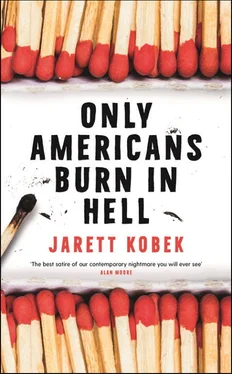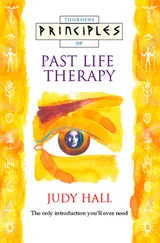“And it was accepted?”
“I’m a doctor now,” said Anthony. “Not that it helps.”
When the end came, it was gentle, except for a brief moment in which Anthony began speaking with the dead.
“I see her there,” said Anthony, his useless machine arm lifting itself and pointing to the empty doorway. “Why are you here, Edith? Keep away! Keep away! You never understood. Everything you said was a lie. Every word. Keep away! Keep away!”
Anthony’s family thought that Anthony was talking to himself.
Fern looked at the doorway with the eyes of Fairy Land.
And for a moment, a luminescent human form was present.
It was a woman dressed in costume from Eighteenth-Century AD America. She was carrying a bouquet of flowers in her right hand and a scythe in her left. A fake beard was plastered on her brow.
One minute Anthony was there.
The next he was gone.
His mother wept.
Fern couldn’t figure out how this woman had given birth to Anthony.
She couldn’t understand how any of his family shared his lineal biology.
The things that they’d argued over while he lay in his sick bed.
Money, property, romances.
He was a man who’d dedicated his life to escaping the suburban isolation of Long Island. He’d thrown himself into the world. He had not left his home in shame or fear, but with the spirit of a conqueror, with the thirst of someone who wanted to know everything.
He is me , thought Fern. I am him .
She too was from an island.
She too had chafed at the isolationism.
She too had fled everything.
Fern returned to their apartment.
She found a xeroxed copy of Anthony’s PhD dissertation.
She read it.
All 263 pages.
She had absolutely no idea what the hell it said.
She walked to Fifth Avenue and went into the Graduate Faculty building of the New School for Social Research.
Before its acquisition by the university, the building had housed a department store.
It still felt like a space dedicated to shopping.
Fern took an escalator to the second floor and wandered past an abstract representation of three-dimensional reality. The abstract representation was a painting that depicted the Bacchae.
Fern found Anthony’s advisor.
He was in his office.
By human standards, he was on the threshold of being ancient.
By Fern’s standards, he looked like a baby.
“Can I help you?” he asked.
“I am Anthony’s girlfriend,” she said.
“It’s a shame,” said Anthony’s advisor.
“Yes,” said Fern. “It is.”
There was a long silence.
“I read his dissertation,” said Fern.
“Did you?” asked the advisor.
“I did not understand a word,” said Fern.
“I’m afraid that we don’t write for the layman,” said the advisor.
Fern left the New School for Social Research and went south down Fifth Avenue, and through Washington Square, and through the West Village until she found herself on Jones Street.
She stood before Caffe Vivaldi.
She went inside.
Folk singers were performing.
The historical anachronicity of Caffe Vivaldi had increased after seven years of globalization.
Fern sat down. She ordered a cappuccino.
She realized that one of the folk singers performing historical anachronisms had also performed historical anachronisms on the night of Fern’s third date with Anthony.
In the Year of the Baroque Promise.
The same person.
Doing the same thing.
Singing the same songs.
James wasn’t there.
He’d taken his filthy mouth back to Columbus.
The advisor’d said that Anthony’s dissertation was one of the best that he’d ever read, that Anthony was a star pupil, that Anthony had conquered everything he’d set out to conquer, that if Anthony had lived he would have made an immeasurable mark on the field, and even if Fern couldn’t understand Anthony’s abstract depiction of three-dimensional reality, she should take pride in it. The advisor was working on posthumous publication. The advisor would write an introduction that served as an in memoriam.
One of the folk singers sang a song by the Carter Family. It was called “Can’t Feel at Home.”
Part of it went like this:
Over in glory land there is no dying there
The saints are shouting victory, there’s singing everywhere
I hear the voice of them that I have heard before
And I can’t feel at home in this world anymore
You could be like Anthony and go out into the wide world and chase the only thing that was worth chasing, which was neither money nor power, nor love or comfort, but knowledge.
Escape the suburbs, rise through the social ranks, read more philosophy than is good for anyone, achieve a practical application in 263 pages.
How does the world work?
The thought was trapped like methane in tar, rising up, until she heard the folksinger, until she’d spoken to the advisor, until she’d read the dissertation and understood nothing.
Oh I have a loving mother over in glory land
I don’t expect to stop until I shake her hand
And I can’t feel at home in this world anymore
You could figure out how the world worked.
Anthony had.
You could develop a working model of how everything fit together.
Anthony had.
And it would mean nothing.
Knowledge was not power.
One person learning how the world worked had zero impact on how the world worked.
The boy who escaped his island only to be poisoned by the girl who’d escaped hers.
Years of fleeing Long Island.
Centuries of visiting the mortal world.
And he died six miles from the house in which he’d been raised.
The folk singer did one more verse:
Heaven’s expecting me, that’s one I know
I fixed it up with Jesus a long time ago
He will take me through though I am weak and poor
And I can’t feel at home in this world anymore
Fern left New York City.
Chapter Twenty-Three
The Full Throat of Christian Virtue
Back in the Twentieth Century AD, there was a genre of writing called Science Fiction.
The writers of Science Fiction speculated about many possible futures.
A great deal of these possible futures involved robots, which were machines that emulated the bodies and practices of humans.
In some books of Science Fiction, the robots were friendly.
In some books of Science Fiction, the robots were mean.
In some books of Science Fiction, the robots replaced the humans.
In some books of Science Fiction, the robots were designed for pleasure.
But the writers of Science Fiction got the robots wrong.
In the whole history of Science Fiction, across all those tedious narratives bound in paper, not a single writer predicted the actual world in which we live.
No one ever suggested that the robots would be total fucking jerks controlled by Russia, or that the robots would use social media platforms to inflame emotions around the hot-button issues facing the 1993 AD Whitney Biennial, and that this use of social media would be part of a campaign to ensure that liberal democracy ate itself from within, and that in using these social media platforms, the robots would enrich a transnational class of oligarchs.
And no one ever suggested that the robots’ use of social media would be quoted in articles written by actual journalists.
And no one ever suggested that these robots, in their mean spirit, would be indistinguishable from a plurality of the actual humans who used social media.
And, yes, reader, I know what happens to any writer who makes the mistake of mentioning Russia: instant Twitter accusations of working for the Russian government!
Читать дальше









![Brian Thompson - A Monkey Among Crocodiles - The Life, Loves and Lawsuits of Mrs Georgina Weldon – a disastrous Victorian [Text only]](/books/704922/brian-thompson-a-monkey-among-crocodiles-the-life-thumb.webp)


